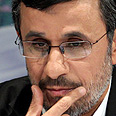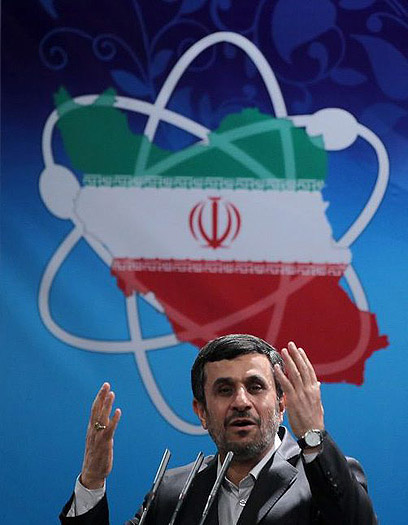
Tougher EU sanctions against Iran come into force
New sanctions against Tehran's major industries aim to cripple country's economy further in hope of forcing compliance with IAEA. Ahmadinejad flouts move, says Iran 'engaged in smart economic war with enemy'
Rigorous new sanctions against Iran's banking, shipping and industrial sectors took effect on Saturday, as part of the European Union's effort to force Tehran to scale back its nuclear program.
The sanctions, agreed in October, entered EU law with their publication in the European Union's Official Journal on Saturday.
Related stories:
- US slaps sanctions on companies with Iran ties
- IAEA reports progress in Iran nuclear talks
- Senate votes to tighten sanctions on Iran
The toughest EU measures yet, they include bans on financial transactions, sales to Iran of shipping equipment and steel, and imports of Iranian natural gas, adding to earlier bans, including on the OPEC producer's oil.
They reflect heightened concern over Iran's nuclear goals and Israeli threats to attack Iranian atomic installations if diplomacy and other measures fail to deliver a solution.
Diplomats said they hope talks with Iran can resume in January, but are waiting for an answer from Tehran, which maintains its nuclear program is for purely peaceful purposes.

Iranian President Mahmoud Ahmadinejad (Photo: EPA)
In a statement, Britain's Foreign Office said there was a clear need "for an urgent solution": "Iran's leaders know that sanctions are having a significant impact," Britain's Minister for the Middle East and North Africa Alistair Burt said.
"They should be in no doubt that the international community will keep up the pressure until they are ready to negotiate in good faith and take the concrete steps needed to convince the international community that they are not building a nuclear weapon."
The new sanctions mark a significant change of policy for the 27-member bloc, which previously sought mainly to target specific people and companies with economic restrictions.
It has lagged the United States in imposing blanket industry bans because it is anxious to avoid penalizing ordinary Iranian citizens, while punishing the Tehran government.
Sanctions have increasingly inflicted severe pain on the Iranian economy, although the country has years of experience of circumventing them by using front companies and tortuous shipping routes.
The new European measures make clear natural gas shipments are prohibited in any form and swapping – as opposed to simply buying – cargoes, is also outlawed.
While imposing a general ban on financial transactions, they make exceptions for those involving humanitarian aid, food and medicine purchases and provisions for legitimate trade.
In a statement, the European Commission said the new law brought the number of entities subject to sanctions to 490 and the total number of persons to 105.
Iran insists that its nuclear program is of a peaceful nature. On Saturday,
Iranian President Mahmoud Ahmadinejad said that the Islamic Republic that although the Western-led sanctions were "hurting," Tehran was fighting back with a "smart economic war."
In an interview with Iran's State TV, Ahmadinejad said that Tehran has been able to weather most of the sanctions that aim to cripple the country's oil and financial sectors.
"Targeted sanctions, which the enemies say are supposed to be crippling, have led to a drop in our oil sales… But they do not even let us transfer the oil money. They thought Iran’s economy would break down, but it did not," he said.
"Iran is engaged in a smart economic war with the enemy," he added.
- Receive Ynetnews updates directly to your desktop










